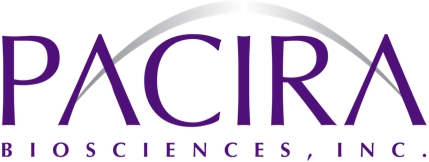Pacira Pharmaceuticals Announces Multiple EXPAREL Data Presentations at the Upcoming New York School of Regional Anesthesia Annual Fall Symposium
The poster presentations will take place at the Exhibit Hall on
Poster #NYS25
Brachial Plexus Block with Liposomal Bupivacaine for Total Shoulder Arthroplasty or Rotator Cuff Repair: Results from a Randomized Controlled Trial
Lead Author:
This Phase 3, multicenter, randomized, double-blind placebo-controlled trial evaluated the efficacy and safety of EXPAREL administered as a brachial plexus block in patients undergoing total shoulder arthroplasty or rotator cuff repair. EXPAREL 133 mg demonstrated comparable tolerability to placebo with a:
- Forty-six percent reduction in pain intensity scores through 48 hours (primary endpoint; P<0.0001)
- Seventy-seven percent reduction in opioid consumption (secondary endpoint; P<0.0001)
- Eighty-nine percent increase in the proportion of opioid-free patients through 48 hours (secondary endpoint; P=0.008)
Poster #NYS26
Addition of Liposome Bupivacaine to Bupivacaine 0.5% in Forearm Nerve Blocks Results in Superior Analgesia to Bupivacaine 0.5% Alone for Dupuytren’s Contracture Release
Lead Author:
This study compared EXPAREL admixed with 0.5% bupivacaine HCl vs. 0.5% bupivacaine alone administered as ulnar and median nerve blocks in patients undergoing Dupuytren’s contracture release utilizing injections of collagenase clostridium histolyticum into the affected cords and manipulation to break up the cords 48 hours after injection. Compared to bupivacaine alone, EXPAREL admixed with bupivacaine resulted in:
- Substantially longer sensory block (1.2 days vs 4.3 days; P<0.001)
- Lower pain scores 24 hours through day 5 after the treatment (GEE P=0.004)
- More patients not requiring additional local anesthetic for fingers manipulation 48 hours after the original injection (6% of bupivacaine patients required no anesthetic vs 85% of EXPAREL patients)
Poster #NYS27
Postoperative Opioid Consumption Is Reduced after Hallux Valgus Repair in Patients given Ankle Blocks with Liposome Bupivacaine Compared to Bupivacaine Alone or General Anesthesia
Lead Author: Sam Van Boxstael, MD
This study compared the administration of ankle blocks with EXPAREL admixed with 0.5% bupivacaine HCl vs. ankle blocks with 0.5% bupivacaine alone to the use of general anesthesia for patients undergoing bunionectomy. Key findings included:
- Lower pain scores in both ankle block groups compared with the general anesthesia group (P=0.016)
- An 83% reduction in mean opioid consumption in the EXPAREL group (vs a 40% reduction in the bupivacaine group) compared to general anesthesia
EXPAREL is indicated for single-dose administration into the surgical site to produce postsurgical analgesia. Pacira is currently working toward a resubmission of its sNDA to the
About Pacira
About EXPAREL®
EXPAREL (bupivacaine liposome injectable suspension) is currently indicated for single-dose infiltration into the surgical site to produce postsurgical analgesia. The product combines bupivacaine with DepoFoam®, a proven product delivery technology that delivers medication over a desired period of time. EXPAREL represents the first and only multivesicular liposome local anesthetic that can be utilized in the peri- or postsurgical setting. By utilizing the DepoFoam platform, a single dose of EXPAREL delivers bupivacaine over time, providing significant reductions in cumulative pain score with up to a 45 percent decrease in opioid consumption; the clinical benefit of the opioid reduction was not demonstrated. Additional information is available at www.EXPAREL.com.
Important Safety Information
EXPAREL is contraindicated in obstetrical paracervical block anesthesia. EXPAREL has not been studied for use in patients younger than 18 years of age. Non-bupivacaine-based local anesthetics, including lidocaine, may cause an immediate release of bupivacaine from EXPAREL if administered together locally. The administration of EXPAREL may follow the administration of lidocaine after a delay of 20 minutes or more. Other formulations of bupivacaine should not be administered within 96 hours following administration of EXPAREL. Monitoring of cardiovascular and neurological status, as well as vital signs should be performed during and after injection of EXPAREL as with other local anesthetic products. Because amide-type local anesthetics, such as bupivacaine, are metabolized by the liver, EXPAREL should be used cautiously in patients with hepatic disease. Patients with severe hepatic disease, because of their inability to metabolize local anesthetics normally, are at a greater risk of developing toxic plasma concentrations. In clinical trials, the most common adverse reactions (incidence greater-than or equal to 10%) following EXPAREL administration were nausea, constipation, and vomiting.
Please see the full Prescribing Information for more details available at: http://www.exparel.com/hcp/pdf/EXPAREL_Prescribing_Information.pdf.
Company Contact:Pacira Pharmaceuticals, Inc. Susan Mesco , (973) 451-4030 susan.mesco@pacira.com Media Contact: Coyne Public RelationsAlyssa Schneider , (973) 588-2270 aschneider@coynepr.com

